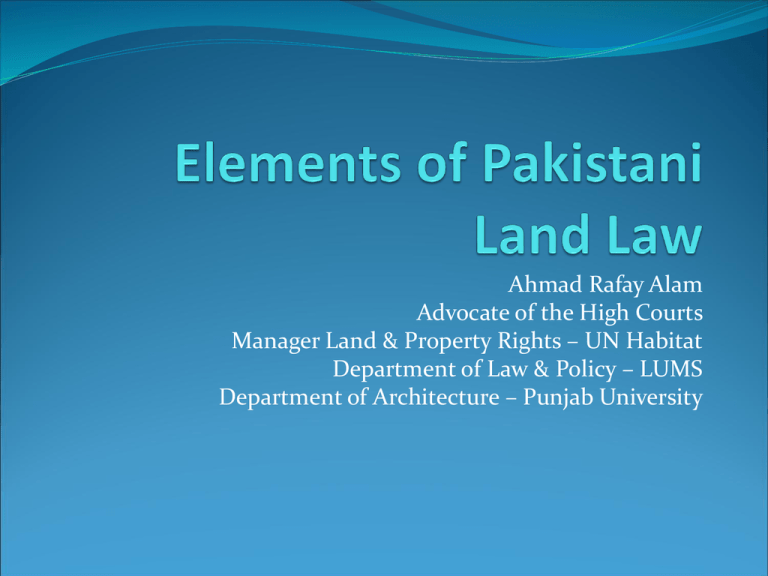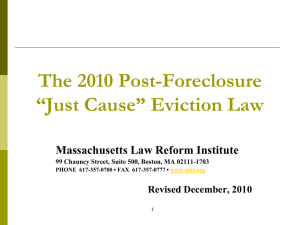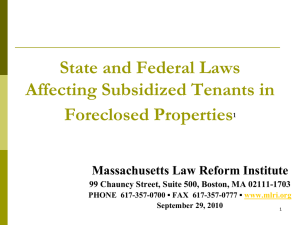Elements of Pakistani Land Law
advertisement

Ahmad Rafay Alam Advocate of the High Courts Manager Land & Property Rights – UN Habitat Department of Law & Policy – LUMS Department of Architecture – Punjab University Legislation The Constitution of Pakistan Provincial Tenancy Acts The Punjab Tenancy Act, 1887 The Sindh Tenancy Act, 1950 The NWFP Tenancy Act, 1950 The Baluchistan Tenancy Ordinance, 1979 Transfer of Property Act, 1882 Registration Act, 1908 The Constitution of Pakistan Article 23: Provision as to property.-Every citizen shall have the right to acquire, hold and dispose of property in any part of Pakistan, subject to the Constitution and any reasonable restrictions imposed by law in the public interest. Difference in right to “acquire” under Pakistani Islamic law and other jurisdictions: Other jurisdictions have concept of “adverse possession” (a.k.a. “squatter’s rights”) Pakistani law does no longer accepts “adverse possession” Urban/Rural Differences The Tenancy Acts all operate on land occupied or let for agricultural purposes Urban/non-agricultural land do not operate under Tenancy Acts; they are controlled by TPA and RA under the regulation of Tehsil and Town Municipal Administrations (in other words, you are either the owner or tenant regulated by urban tenancy legislation; there are no more categories). Tenancy Acts Definitions of landlord and tenant Punjab Tenancy Act, 1887 Occupancy Tenants Tenants for a Fixed Term under contract Tenants at Will Sindh Tenancy Act, 1950 Permanent Tenants Tenants at Will NWFP Tenancy Act, 1950 Occupancy Tenants deemed owners Fixed Term Tenants Tenants at Will Baluchistan Tenancy Ordinance, 1979 Occupancy Tenants Lathband Tenants Tenants at Will Working categories of land security (Oxam) Small holders (owners) Landless tenants and labourers with secured possession Landless tenants and labourers without secured possession In katcha areas Outside katcha areas Roughly follows the distinctions provided for in the Tenancy Acts (though there are exceptions) Rights of Tenants Punjab Tenancy Act, 1887 OTs can only be ejected if they (i) render the land unfit; (ii) haven’t paid rent or if there is (iii) a decree for ejection against them. OTs can alienate/sub-let right to occupy, but LL has right of first refusal. Islamic law of succession operates on Muslim OTs and procedure for devolution of non-Muslim OTs given. FTT can be ejected on the same grounds as OTs. Tenants at Will (year to year tenants) may be ejected at the end of the year. Succession of non-OTs also given (to preferred heir or eldest male child) Note that there is a procedure for ejectment Rights of Tenants II Sindh Tenancy Act, 1950 PT cannot be terminated unless acquired by Govt. or unless conditions in Section 13 met (even then, ejection cannot take place without order of Tribunal). Tenants at Will to acquire permanent rights if, after 1950, they annually cultivate at least 4 acres for a continuous period of 3 years. Tenants at Will shall not be liable to eviction before the end of the cropping season. Dispute resolution procedure (before a Tribunal) provided for. Rights of Tenants III NWFP Tenancy Act OTs granted proprietary rights. FTT can only be ejected if grounds in Section 23 met. Tenants at Will may be ejected on the 3rd year from the commencement of their tenancy if grounds in Section 24 met. Ejectments restricted to cases where (i) decree passed against tenant remains unsatisfied and (ii) where tenant does not hold under contract, Order or decree. Rights of Tenants IV Baluchistan Tenancy Ordinance, 1979 OT can be ejected if grounds mentioned in s. 31 met. Lathband tenants can be ejected if grounds mentioned in s. 32 met. Tenants at Will can be ejected if grounds mentioned in s. 44 met. Ejectment actions against OT & Lathband tenants must be preceded by applications to Revenue Court. OTs may alienate their right of occupancy, but LL has right of first refusal. OTs may also sub-let, but with approval of LL. Succession for Muslim and non-Muslim OTs & Lathband tenants provided for. Transfer of Property Act & Registration Act “Sale” of property is transfer of ownership; can only be affected by registered instrument. “Lease” is transfer of the right to enjoy property for a fixed period on payment of rent or kind. Leases of more than one year can only be affected by registered instrument. In the absence of a contract, lease of agricultural land will be deemed to be from year to year. RA lists documents/transactions that are compulsorily registerable. These include sale and lease (for a year or more) deeds. Presumption of validity attached to registration. Non-registration results in nullification of instrument. Thank You – Be Green!!











